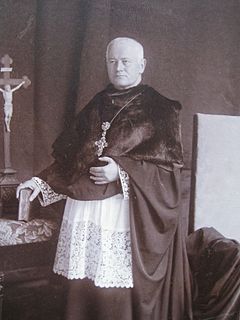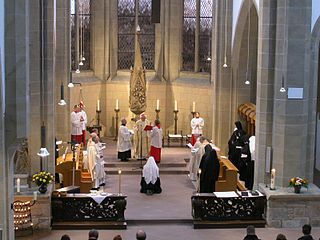The conditions for the canonical erection of a house of religious are indicated in canons 608-611 of the 1983 Code of Canon Law. [1]
The conditions for the canonical erection of a house of religious are indicated in canons 608-611 of the 1983 Code of Canon Law. [1]
A community of religious must live in a lawfully established house with a church or oratory in which the Eucharist is celebrated and reserved. The community is to have a superior designated in accordance with canon law. [2]
The house in which the community resides is distinct from any farm or holiday home that they may also possess. [3]

It is the superior indicated in the constitutions of the religious institute concerned (the superior general or the provincial) who is to establish the house after obtaining in writing the consent of bishop of the diocese. In addition, the permission of the Holy See is required for establishing a monastery of nuns. [4] The word "nuns" applies in canon law to women religious whose vows are classified as solemn. These normally live a contemplative cloistered life of meditation and prayer. Other women religious do not need permission from the Holy See to establish a new house.
In 451, the Council of Chalcedon laid down the condition of the assent of the bishop. Privileges granted to the mendicant orders in the 13th century caused frequent derogations from the law, but the Council of Trent restored the ancient discipline (Sess. XXV, de Reg., cap. iii). The term used in the Code of Canon Law is "bishop", not "ordinary". Accordingly, the required permission cannot be given by a vicar-general or a diocesan administrator. The permission of the parish priest of the place is not required. [3]
Consideration must be given to the advantage that is to accrue to the Church and the religious institute from establishment of the house and to the requirements for the members to live their religious life properly. A prudent judgment that the sustenance of the community will be provided for is also a condition. [5]
Once it has obtained the consent of the bishop for the establishment of the house, the religious community has the right

In Catholicism, an abbess is the female superior of a community of nuns, which is often an abbey.

A nun is a member of a religious community of women, typically living under vows of poverty, chastity, and obedience in the enclosure of a monastery. Communities of nuns exist in numerous religious traditions, including Buddhism, Christianity, Jainism, and Taoism.
A religious order is a lineage of communities and organizations of people who live in some way set apart from society in accordance with their specific religious devotion, usually characterized by the principles of its founder's religious practice. The order is composed of laypeople and, in some orders, clergy. Religious orders exist in many of the world's religions.

A prelate is a high-ranking member of the clergy who is an ordinary or who ranks in precedence with ordinaries. The word derives from the Latin praelatus, the past participle of praeferre, which means 'carry before', 'be set above or over' or 'prefer'; hence, a prelate is one set over others.

The Society of Saint Pius X is an international priestly fraternity founded in 1970 by Marcel Lefebvre, a traditionalist French Archbishop.

A hermit, or eremite, is a person who lives in seclusion. Hermits are a part of several sections of various religions and this concept has garnered significant attention and importance.

In the Catholic Church, a religious order is a community of consecrated life with members that profess solemn vows. According to the 1983 Code of Canon Law, they are classed as a type of religious institute.
In Catholic canon law, a solemn vow is a vow that the Church has recognized as such.

Religious vows are the public vows made by the members of religious communities pertaining to their conduct, practices, and views.

Canons regular are canons in the Catholic Church who live in community under a rule and are generally organised into religious orders, differing from both secular canons and other forms of religious life, such as clerks regular, designated by a partly similar terminology.
A religious is, in the terminology of many Western Christian denominations, such as the Catholic Church, Lutheran Churches, and Anglican Communion, what in common language one would call a "monk" or "nun", as opposed to an ordained "priest". A religious may also be a priest if he has undergone ordination, but in general he is not.
Valid but illicit and valid but illegal are descriptions applied in the Catholic Church to an unauthorized celebration of a sacrament or an improperly placed juridic act that nevertheless has effect. Validity is presumed whenever an act is performed by a qualified person and includes those things which essentially constitute the act itself as well as the formalities and requirements imposed by law for the validity of the act. Canon law also lays down rules for lawful placing of the act, beyond its validity.
Consecrated life is a state of life in the Catholic Church lived by those faithful who are called to follow Jesus Christ in a more exacting way. According to the Catechism of the Catholic Church, it "is characterized by the public profession of the evangelical counsels of poverty, chastity, and obedience, in a stable state of life recognized by the Church". The Code of Canon Law defines it as "a stable form of living by which the faithful, following Christ more closely under the action of the Holy Spirit, are totally dedicated to God who is loved most of all, so that, having been dedicated by a new and special title to his honour, to the building up of the Church, and to the salvation of the world, they strive for the perfection of charity in the service of the kingdom of God and, having been made an outstanding sign in the Church, foretell the heavenly glory."
An institute of consecrated life is an association of faithful in the Catholic Church erected by canon law whose members profess the evangelical counsels of chastity, poverty, and obedience by vows or other sacred bonds. They are defined in the 1983 Code of Canon Law under canons 573–730.
A canonical visitation is the act of an ecclesiastical superior who in the discharge of his office visits persons or places with a view to maintaining faith and discipline, and of correcting abuses. A person delegated to carry out such a visitation is called a visitor. When, in exceptional circumstances, the Holy See delegates an apostolic visitor "to evaluate an ecclesiastical institute such as a seminary, diocese, or religious institute ... to assist the institute in question to improve the way in which it carries out its function in the life of the Church," this is known as an apostolic visitation.
An archconfraternity is a Catholic confraternity, empowered to aggregate or affiliate other confraternities of the same nature, and to impart to them its indulgences and privileges.

This is a glossary of terms used within the Catholic Church.
A religious institute is a type of institute of consecrated life in the Catholic Church where its members take religious vows and lead a life in community with fellow members. Religious institutes are one of the two types of institutes of consecrated life; the other is that of the secular institute, where its members are "living in the world".
In the canon law of the Catholic Church, exclaustration is the official authorization for a member of a religious order bound by perpetual vows to live for a limited time outside their religious institute, usually with a view to discerning whether to depart definitively.

A religious sister in the Catholic Church is a woman who has taken public vows in a religious institute dedicated to apostolic works, as distinguished from a nun who lives a cloistered monastic life dedicated to prayer. Both nuns and sisters use the term "sister" as a form of address.